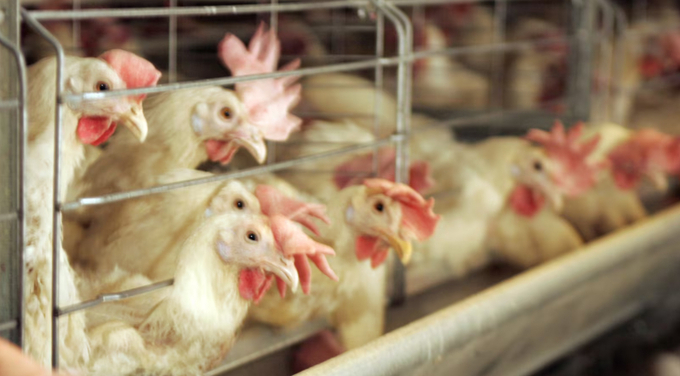December 5, 2025 | 20:25 GMT +7
December 5, 2025 | 20:25 GMT +7
Hotline: 0913.378.918
December 5, 2025 | 20:25 GMT +7
Hotline: 0913.378.918

This file photo shows egg-producing chickens in a barn at the Heartland Quality Egg Farm in Logan County, Ohio. Avian flu has decimated chicken and turkey flocks across a dozen states.
Ohio recorded its first probable human case of highly pathogenic avian influenza, or bird flu.
According to the Ohio Department of Health, the patient is a man who works at a farm in Mercer County and was in contact with dead commercial poultry infected with the virus.
The risk to the general public of contracting the disease is considered low by the Centers for Disease Control and Prevention, but the ODH said those who have close or prolonged contact with infected birds are at higher risk.
People should avoid direct contact with wild birds or sick or dead poultry and contact their local health department or veterinarian for further guidance.
Ohio has the highest number of HPAI cases in the U.S. among commercial poultry operations, with more than 10.7 million chickens and turkeys infected between Jan. 9 and Tuesday, according to data reported by the U.S. Department of Agriculture and Ohio Department of Agriculture.
Mercer County, where the first probable human case was reported, has the highest rate of illness this year in the state with more than 5.7 million cases since Jan. 14. So far in February, there have been nearly 1.2 million cases involving more than 1 million egg-laying chickens, nearly 20,000 pullets — or chickens less than a year — and more than 90,300 turkeys.
In Darke County, there have been more than 5 million cases reported since Jan. 9. This month through Feb. 6, there were 527,629 cases involving more than 522,000 layers and nearly 5,400 turkeys.
Only two other sites in Ohio have reported cases this year, both involving commercial turkeys. More than 11,000 sick birds were reported Feb. 5 in Auglaize County and more than 21,000 were reported Jan. 30 in Van Wert County in the northwestern part of the state.
In all cases, the premises were quarantined and the birds were killed to help prevent the spread of disease, the ODA reported.
Ohio is the second-largest egg producing state, behind Iowa. In 2023, Ohio produced more than 11 billion eggs. In the USDA’s 2022 Census of Agriculture, Ohio had more than 20 million broilers and other meat-type chickens, as well as 38.5 million layers and 11.8 million pullets.
For people who work with poultry, the ODA follows USDA guidelines on cleaning and disinfecting and its cautions to the poultry industry about who enters its facilities and can be around the birds, said Bryan Levin, public information officer for the state agriculture department.
“Even when following biosecurity practices it is a tough disease to stop,” Caden Buschur, agriculture and natural resources educator for Ohio State University Extension’s Darke County office said previously. “Wild birds are thought to be a big contributor to the spread of the disease.”
HPAI cannot be transmitted through properly cooked meat or eggs. Products from any HPAI-affected flocks are prohibited from entering the food system. However, the ODA recommends proper handling and cooking of all poultry and eggs to an internal temperature of 165 degrees Fahrenheit as a general food safety precaution.
Anyone who has been exposed to a sick or dead bird should self-monitor for any new respiratory symptoms and contact a health care provider or local health department if any develop.
Nationwide, there have been 68 confirmed human cases of his strain of bird flu in 11 states since the start of 2024, leading to one death in Louisiana. All but three cases came from exposure to commercial agriculture or wild birds. There are no known cases of human-to-human transmission.
ODH Director Dr. Bruce Vanderhoff said, “While the risk to Ohioans is low, the best way to prevent bird flu is to avoid unprotected exposures to sick or dead birds or to their environment. People should avoid direct contact with poultry or wild birds and take proper precautions, including reaching out for guidance regarding personal protection and safe handling, if you must be around sick or dead birds.”
Daytondailynews

(VAN) As of 2025, the ASEAN region has a total of 69 ASEAN Heritage Parks recognized across its 10 member states. Among them, Viet Nam contributes 15 ASEAN Heritage Parks.

(VAN) Yok Don National Park has high biodiversity with numerous endemic plant and animal species, and it is also the only dipterocarp forest ecosystem conservation area in Viet Nam.

(VAN) Viet Nam and Brunei signed two important MOUs on fisheries and IUU, expanding cooperation in agriculture, the environment, and Halal exports, aiming to substantively implement joint projects.

(VAN) The Viet Nam Coconut Association worked with the International Finance Corporation (IFC) and businesses to promote the supply chain, enhance competitiveness, and develop the coconut industry sustainably.
![Hue aims for Net Zero: [2] Pioneering low-emission tourism](https://t.ex-cdn.com/nongnghiepmoitruong.vn/608w/files/huytd/2025/12/04/0633-dulichzero-4-095634_236-161125.jpg)
(VAN) The ancient capital of Hue has developed Net Zero tourism products and models, aiming to reduce carbon emissions and pioneer the establishment of Viet Nam's green tourism destination.

(VAN) C.P. Viet Nam has announced the successful completion of its goal to plant 1.5 million trees during the 2021-2025 period, a key milestone within company's long-term ESG strategy and its roadmap for emission reduction.

(VAN) This is an initiative of MAE aimed at creating a unified coordination mechanism to implement agricultural cooperation programs with developing countries.